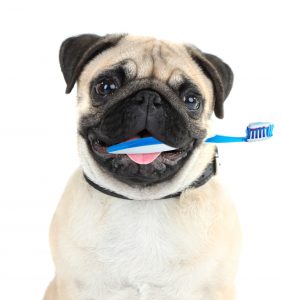Dental Health
Dental Health is something that is commonly overlooked by pet owners. Dogs and cats, just like us can have teeth and gum problems which can lead to diseases that can cause a lot of bad breath, redness, and most importantly pain. Not only can significant disease occur in the mouth, but it can affect the kidneys and heart valves causing a significant infection that will cause permanent damage to those organs.
So what do you do if your pet has bad breath?
Once bad breath has been noticed by you or your veterinarian there is already significant disease occurring in the mouth.
An exam of the mouth and the dentition is part of every wellness physical exam. During this time your veterinarian will look for signs of dental disease such as:
- red gums
- tooth root exposure
- tartar along the gumline
- pus around the gumline
- missing teeth
- soft tissue growths
If any of these symptoms are seen, the next step would then be a thorough oral exam and x-rays of the entire mouth under general anesthesia. This would allow your veterinarian to examine all the teeth and the inside of the mouth.
There are several factors to look at while conducting this thorough exam, such as:
- deep pockets in the gum tissue around teeth
- root exposure
- loss of bone around tooth roots
- resorption of crowns and roots
- broken crowns and tooth enamel with pulp exposure
- severe crowding of teeth affecting the most important teeth in the mouth for jaw stability and chewing
All of these factors will contribute to the decision of whether or not surgical extractions of teeth needs to take place.
Our Recommendation….
At Wright Veterinary Medical Center we recommend at least a two-part approach to dental and mouth care to help prevent dental disease.
HOME CARE
- brushing the teeth
- daily VOHC (Veterinary Oral Health Council) approved dental chews and diets
- dental rinses and gels
We also recommend avoiding any hard chewing items such as real bones, antlers, hooves, rocks, nylabones, etc. which can contribute to breakage of teeth, infection, and the loss of teeth.
Taking these dental disease prevention tips will lead to a healthier happier mouth for your furry family member. If you have any dental health concerns for your pet, please contact your veterinarian.